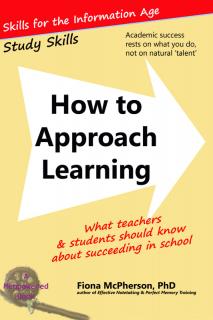Academic success is rooted in a number of factors, of which 'intelligence' is only one. Attitude and beliefs, and knowledgeable strategy use, are critical. This is the core message of this collection of articles and research reports on study skills from the author's websites, arranged and edited for greater cohesiveness. Its aim is to describe and provide evidence for concepts and strategies that may change your approach to teaching or studying.
The book contains articles on:
- personal factors that affect academic achievement: motivation, persistence, anxiety, intelligence, self-regulation
- choosing strategies that are effective for the situation
- what 'transfer' is and why it's important
- how experts develop expertise
- the idea of 'desirable difficulties'
- the limits of memorization and rote learning
- some useful strategies in:
- reading
- note-taking
- reaching understanding.
This book is for students who are serious about being successful in study, and teachers who want to know how best to help their students learn.
As always with the Mempowered books, the short book is fully referenced.
Publication date: May, 2015
File size: 1.8 Mb (ePub, pdf) / 3.5 Mb (mobi) / 90 pages
ISBN:
978-1-927166-30-7 (pdf)
978-1-927166-28-4 (ePub)
978-1-927166-29-1 (mobi)
How to approach your teaching or learning
What you need for successful learning
Intelligence isn’t as important as you think
What is intelligence?
Working memory and intelligence
The importance of cognitive control for intelligence
Brain flexibility predicts learning speed
The role of motivation on academic performance
Motivation, study habits—not IQ—determine growth in math achievement
How expectations affect exam scores
Seeing exemplary peer work can undermine student performance
Short online ‘pep talks’ can boost students
Effect of motivation on IQ score
Those less motivated to achieve will excel on tasks seen as fun
Anxiety
Stereotype threat is a potential factor for gender, ethnicity, and age
Group settings hurt expressions of intelligence, especially in women
Working memory capacity affects emotional regulation
The effect of stress on performance depends on individual and situational factors
Easy solution for test anxiety
Letters A and F affect test scores
Self-regulation
Regulating your study time and effort
Maybe persistence has nothing to do with self-control
Multitasking
Media multitasking and academic achievement
Interruptions impact the quality of creative work
Each hour of screen time linked to poorer grades
Digital media may be changing how you think
Choosing your strategies
Metamemory
Using strategies effectively
Assessing strategy
Successful Transfer
Preventing interference between topics or skills
Context & the conditionalization of knowledge
About expert knowledge
Desirable difficulty for effective learning
Using hard to read fonts may help you remember more
Should learning facts by rote be central to education?
Photographic memory
Strategies for successful study
Reading
Working memory, expertise & retrieval structures
Understanding scientific text
Novices' problems with scientific text
Identifying text structures
Why good readers might have reading comprehension difficulties and how to deal with them
Speed Reading
Effects of diagram orientation on comprehension
Note-taking
Notetaking examples
Outlines and Graphic organizers
Concept maps
Visual language
Students fail to connect without explicit instruction
Better learning through handwriting
Drawing best encoding strategy
Reaching Understanding
Elaborating the information for better remembering
Asking better questions
Metacognitive questioning and the use of worked examples

